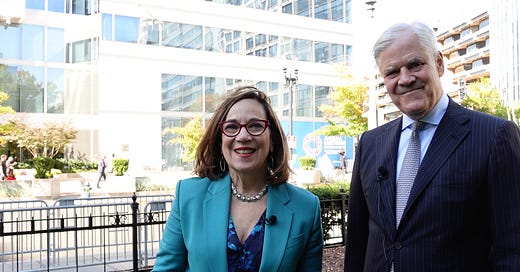The week of the IMF and World Bank annual meetings is a very special one in Washington D.C. It draws top economists, policy makers, academics and thought leaders from around the world - people like Andreas Dombret who I met at the annual meeting of the Reinventing Bretton Woods Committee where he chaired the panel
”Mitigating the Fragmentation of the Global Economy and the Future of Global Growth.”
Fragmentation is one of the most used, most heard words in circles like these as tariffs and protectionism become not only a threat but a growing reality. The IMF stressed over and over in speeches and panels this week that global trade is now growing slower that global growth, this in a world where free trade has long been seen as a bedrock of a dynamic global economy. And with a possible next president of the U.S. making tariffs a bedrock of his policy plans, everyone is bracing for what likes ahead.
Andreas and I met up later at a park that lies between the IMF and World Bank to dig deeper into fragmentation: what it is, what’s driving it, and where it goes next.
He starts by noting that he is from Germany “a very independent, very open economy… and that’s why it’s very important to us to have free trade and open economies everywhere.
”I say this as a German. Germany is a very independent, very open economy, as you would expect. And that's why it's very important to us to have a free and open economies everywhere,” he says.
There has been constant chatter, constant commentary at all kinds of IMF and World Bank events on what Trump tariffs would mean for the global economy - virtually all of it negative. Andreas zeroes on what he sees: that the IMF is also growing more alarmed about the direction this is going as evidenced by an important addition to its report on the global economy.
“ I don't know whether Mr. Trump would be reelected or not, but in principle, there's a good reason why the IMF did put trade barriers into the World Economic Report Outlook report, which is very important,” he says.
Andreas drew on his years at the Bundesbank and later at the European Central Bank to share his views about monetary policy and how the ECB’s path differs from the Federal Reserve’s. He zeroed in on the burden of high energy prices for Europe, one outcome of the war in Ukraine.
Where will this go? “I am not very optimstic right now about the situation in the Ukraine, very very unfortunately because the support of the West, of the Western alliance isn’t as strong as it should be.”
So dive right in and hear a European’s, a globalist’s, perspective. It’s in the air as policymaker’s, practitioners, and thought leaders from around the world have descended on Washington. Join them as you listen to Andreas Dombret.
Andreas Dombret was born in the USA to German parents. He studied business management in Münster and earned his PhD in Nuremberg. From 1987 to 1991 he worked at Deutsche Bank, from 1992 to 2002 at JP Morgan, from 2002 to 2005 as partner at Rothschild before serving Bank of America as European Vice Chairman between 2005 and 2009. Between 2010 and 2018, Andreas was on the Executive Board of the Deutsche Bundesbank, on the Board of the Bank for International Settlements and on the ECBs Supervisory Board. In addition he acted as German central bank representative at the IMF, the German Financial Stability Commission and the Basel Committee on Banking Supervision. Andreas was awarded an honory professorship by the European Business School and also teaches at Columbia University.
Andreas advises a range of international financial services companies and, among others, is a member of the International Advisory Board of Santander.











Share this post